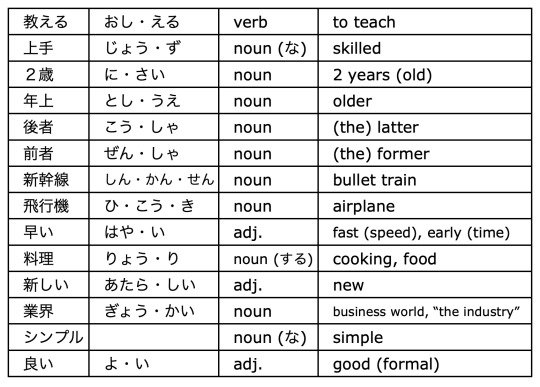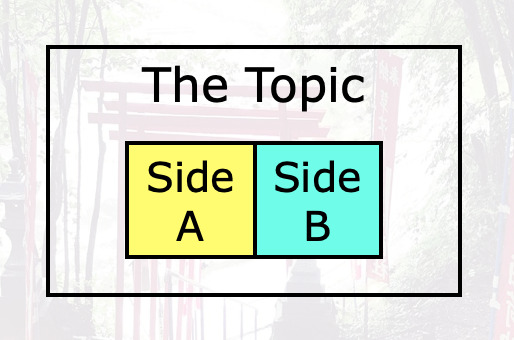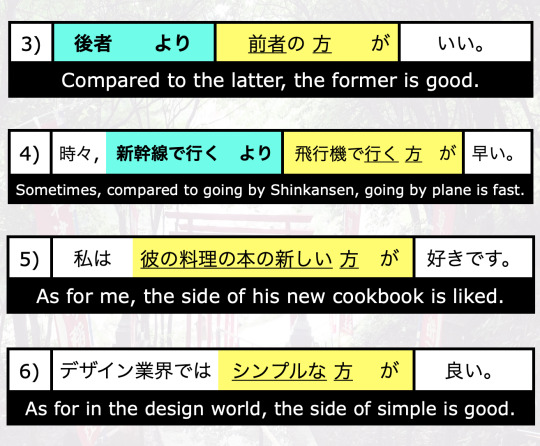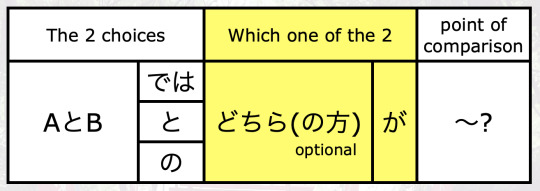Photo

Writing your Resume in Japanese 📝 PS: Learn Japanese with the best FREE online resources, just click here https://www.japanesepod101.com/?src=tumblr_resume_image_120921
45 notes
·
View notes
Text
52 notes
·
View notes
Text
さよならニッポン (記事)
今日読んだ記事は新型コロナウイルスのせいで留学中止になった二人の話について記事です。日本で留学できる直前に「さよならニッポン」と言わなければいけない方がたくさんいますよね。早くコロナ禍が終息しますように。
The article I read today was about the stories of two people who were unable to study abroad in Japan due to coronavirus. There are many people who have had to say "goodbye, Japan" just before they were about to study abroad in Japan. I hope that the coronavirus pandemic will be resolved quickly.
さよならニッポン、夢みた人たちの苦悩
Goodbye Japan, the Mental Anguish of Those with a Dream

Vocabulary・単語
苦悩 くのう mental anguish
直前 ちょくぜん just before
途切れる とぎれる to be interrupted, to come to an end
憧れる あこがれる to admire, to long for
関心 かんしん interest
進める すすめる to advance, to move forward
代理店 だいりてん agency
担当者 たんとうしゃ person responsible, contact person
告げる つげる to inform, to announce
いったん briefly, temporarily
---
対策 たいさく measure, countermeasure, plan
新規 しんき new, fresh
認める みとめる to accept, to admit
期限 きげん term, period, time frame
変更 へんこう change, modification
揺れる ゆれる to waver
就職する しゅうしょくする to find a job
相次ぐ あいつぐ to follow in succession
加盟する かめいする to participate
調査結果 ちょうさけっか results (of a study)
---
見通し みとおし prediction
仮に かりに temporarily
制限 せいげん restriction
緩和 かんわ mitigation
半数 はんすう half the number
事業 じぎょう operations
継続 けいぞく continuation
撤退 てったい withdrawal
検討 けんとう consideration
政策 せいさく policy
---
施策 しさく policy, measure
役割 やくわり role, duties
人材 じんざい personnel
接種 せっしゅ inoculation
再開し さいかい reopening
地域 ちいき region
対応 たいおう handling, response
往来 おうらい coming and going, traffic
出入国在留管理庁 しゅうにゅうこくざいりゅうかんりちょう Immigration Bureau of Japan
厚生労働省 こうせいろうどうしょう Ministry of Health, Labour and Welfare
---
原則 げんそく principle, general rule
特段の事情 とくだんのじじょう exceptional circumstances
直面する ちょくめんする to face, to confront
勤務先 きんむさき place of employment
技能実習生 ぎのうじっしゅうせい foreign trainee in Japan on a technical intern training visa
法的 ほうてき legal
配偶者 はいぐうしゃ spouse (legal term), partner
責任 せきにん responsibility
医療事務 いがくじむ health care administration
ひっ迫する ひっぱくする to be strained, to be tense
---
感染 かんせん infection
署名 しょめい signature
到達する とうたつする to attain
提出する ていしゅつする to submit
入籍 にゅうせき entry in family register
隔離 かくり separation, isolation, quarantine
制度 せいど system, institution, organization
切実 せつじつ earnest, sincere
困難な こんなんな difficulty; infeasibility
きめ細かな きめこまかな smooth; meticulous
194 notes
·
View notes
Text
ナミヤ雑貨店の奇蹟 - 単語 7

第二章 - 「夜明けにハーモニカを」(2)
腎臓 「じんぞう」 - kidney
通夜 「つや」 - wake (all night vigil over a body)
肘 「ひじ」 - elbow
スツール - stool
籐椅子 「とういす」 - swivel chair(?) -> this kind of chair x
フォークギター - folk guitar
謙遜 「けんそん」 - humility
しばしば - often, repeatedly
軟化 「なんか」 - softening (of attitude)
質屋 「しちや」 - pawnshop
質流れ品 「しちながれひん」 - forfeited item
仏頂面 「ぶっちょうづら」 - sour look
枕元 「まくらもと」 - bedside
教本 「きょうほん」 - textbook
軽音楽 「けいおんがく」 - popular music
披露 「ひろう」 - performing
既存 「きそん」 - existing
猛反対 「もうはんたい」 - existing
家業 「かぎょう」 - family business
既定路線 「きていろせん」 - established procedure
露ほど 「つゆほど」 - little bit
見出す 「みいだす」 - to notice, to find out
落第 「らくだい」 - failure (in studies)
喚く 「わめく」 - to shout, to cry
音楽評論家 「おんがくひょうろんか」 - music critic
ざらにいる - common (of people)
膨らむ 「ふくらむ」 - to swell (out)
無機質 「むきしつ」 - cold, robotic
新味 「しんみ」 - originality, freshness
102 notes
·
View notes
Text
Auxiliary Verb 込む (Updated)

上がり込む 「あがりこむ」 - 人の家の中などに入って座ってしまう。おかまいなしに、上がる。
To enter (house, room, etc.), to step in
当て込む 「あてこむ」 - よい結果を期待して行動する
To anticipate, to expect
編み込む 「あみこむ」 - 編み物で、模様を入れて編む。また、異なる素材を入れて編む。
To weave within (hair, fabric, etc.); to braid
勢い込む 「いきおいこむ」 - 奮いたって何かをする。勇みたつ。
To do with enthusiasm, to be excited to do, to throw oneself into
生け込む 「いけこむ」 - 花や枝などを花器にさして形を整える。
To arrange (e.g. flowers), to decorate
埋け込む 「いけこむ」 - 地面や灰などに穴を掘ってうめる。
To bury (e.g. in ash, snow, earth), to cover
打ち込む 「うちこむ」 - 上から強くたたいて中へ入れる。
To drive in (a wedge, etc)
埋め込む 「うめこむ」 - 物の全部または一部を、中に入れ込む。
To bury, to embed
植え込む 「うえこむ」 - 草木などを土の中にしっかり植える。 ある物を、他の物の中にしっかりとはめ入れる。
To plant, to insert
思い込む 「おもいこむ」 - 深く心に思う。決心する
To be under the impression (that…), to be convinced (that…)
落ち込む 「おちこむ」 - 落ちて、中のほうへ入る。気持ちがめいる。
To fall into, to be depressed
追い込む 「おいこむ」 - 広い所にいるものを、追い立ててある場所に入れる。
To drive (something) into
教え込む 「おしえこむ」 - 十分に教える。
To teach thoroughly, to instill in
刈り込む 「かりこむ」 - 草木の枝葉や頭髪を刈って形を整える。文章を推敲して不要な部分を削る。
To trim a bush, to trim unnecessary parts from a writing.
書き込む 「かきこむ」 - 文章の行間や余白に字などを書き加える。書き入れる。
To fill out/in (a form)
駆け込む 「かけこむ」 - 走って中に入る。 押しかける。
To rush into
組み込む 「くみこむ」 - あるものを全体の一部としてその中に入れる。組み入れる。
To incorporate
差し込む 「さしこむ」 - 物の中やすきまなどに、他の物をさしたりはさんだりするようにして入れる。
To insert
染み込む 「しみこむ」 - 液体や気体、色などが物の中まで徐々に深くしみる。
To soak into
吸い込む 「すいこむ」 - 液体や気体などを、吸って中のほうまで入れる。
To inhale/breathe in, to absorb
立て込む 「たてこむ」 - 1か所に多くの人が集まって混雑する。仕事や用件が一時に多く重なる。
To be crowded, to be busy.
頼み込む 「たのみこむ」 - 熱心に頼む。強く頼む。
To plead, to ask repetitively
突っ込む 「つっこむ」 - 勢いよく中へ入る。突入する。
To thrust something into, to plunge into
詰め込む 「つめこむ」 - 物を入れ物にできるだけたくさん入れる。
To pack (something), to stuff

連れ込む 「つれこむ」 - ある場所へ人を伴って一緒に入る。引っぱり込む。
To bring someone along
溶け込む 「とけこむ」 - 液体や気体の中に他の物質が溶けてまじる。
To melt into, to merge into
飛び込む 「とびこむ」 - 身をおどらせて中へはいる。突然はいり込む。急いではいる。
To jump in, to rush into
にえ込む 「にえこむ」 - はまり込む。めり込む。
To get stuck in, to sink into
逃げ込む 「にげこむ」 - 逃げて、ある場所へ入り込む。
To take refuge in, to run into
煮込む 「にこむ」 - いろいろな材料をまぜて煮る。
To simmer, to stew
飲み込む 「のみこむ」 - 飲んでのどを通す。また、かまずにまる飲みにする。出そうになった言葉・あくびなどを出さずにおさえる。
To swallow (foods, words, etc.), to understand.
入り込む 「はいりこむ」 - 無理に押し分けてはいる。すっかり中にはいる。
To go into, to step into
話し込む 「はなしこむ」 - 腰を落ちつけて、じっくりと話をする。
To have a long talk
冷え込む 「ひえこむ」 - 気温がひどく下がる。寒さが厳しくなる。
To become (very) cold.
吹き込む 「ふきこむ」 - 風が吹いて中へ入りこむ。
To blow into
老け込む 「ふけこむ」 - すっかり年寄りじみたようすになる。
To age
塞ぎ込む 「ふさぎこむ」 - 元気を失ってうっとうしい気分になる。ひどく憂鬱になる。
To be in low spirits, to be depressed
巻き込む 「まきこむ」 - 巻いて中へ入れる。
To be caught in (something), to involve (something) in
紛れ込む 「まぎれこむ」 - まちがって入り込む。いつのまにか他の物の中に入り込む。混雑をうまく利用して入り込む。
To slip into, to be lost in, to be mixed up with
負け込む 「まけこむ」 - 負けた回数が多くなる。
To repeatedly lose
見込む 「みこむ」 - あてにする。望みをかける。
To count on, to anticipate.
持ち込む 「もちこむ」 - 物を持って中にはいる。相談や用件などをもってくる。
To bring something (items, discussion, etc.) along
盛り込む 「もりこむ」 - 盛って中に入れる。
To incorporate.
読み込む 「よみこむ」 - よく読んで自分のものとする。 コンピューターで、補助記憶装置にあるデータを本体のメモリー上に移し入れる。
To read thoroughly, to read/load data (in a computer system)
割り込む 「わりこむ」 - 無理に押し分けて入り込む。 取引相場で、相場がある値段より安くなる。
To cut into (a line, conversation, etc.), to force oneself into, to fall below (of stock prices, sales, etc.)
189 notes
·
View notes
Text
Different kanji, same meaning ? 奇跡と奇蹟の違い
ナミヤ雑貨店の奇蹟 ノート (2)
when I first started reading this book, i thought the title was ナミヤ雑貨の奇跡 - until someone's comment made me realise the kanji actually used wasn't 奇跡 but 奇蹟!
Both kanjis 跡 and 蹟 have the same readings (セキ/あと), similar meanings, ‘remains’, ‘traces’, ‘footprints’ ... and share the same radical 足「あし」 foot/leg. so, what difference does it make to choose one kanji over the other?
as 奇跡 seems to generally be the more commonly used writing, there must be a reason as to why the author chose to use 奇蹟 instead.
i asked our good friend google and here’s the result i got :

according to this definition, 奇蹟 means a miracle in a religious sense, mainly a christian one ; 'a supernatural occurence caused by God to demonstrate his power to the people'. [the buddhist equivalent of this word is apparently 霊験「れいげん」]
in the other hand, 奇跡, the more commonly seen writing ; is used to talk about a strange event that can't be understood though science, something that should be impossible, generally a situation changing for the better; a miracle, but this time devoid of any religious meaning.


kanji can be complicated but they are fun~
59 notes
·
View notes
Text
隔たり・隔たる(へだたり・へだたる):〔距離が離れている〕be distant ;〔離れている〕be apart
⋆両者の主張は隔たっている
The opinions of the two are far apart.
⋆彼らの能力は大きく両者の主張は隔たっている
The opinions of the two are far apart.
33 notes
·
View notes
Text
Accounting in Japanese
経理 けいり accounting
経理部 けいりぶ accounting department
経理士 けいりし accountant
経費 けいひ expenses
売り上げ うりあげ sales, proceeds
自転車操業 じてんしゃそうぎょう barely keeping a business going (analogy that a bicycle falls over when the wheels stop rotating) - receiving money only to turn around and spend it
赤字 あかじ deficit, in the red
経費削減 けいひさくげん cost reduction
経費節約 けいひせつやく curtailment of expenditure
粉飾決算 ふんしょくけっさん fraudulent accounting, creative accounting
85 notes
·
View notes
Text
HSK4 Vocab #6
I actually took the HSK 4 on Saturday! While reviewing I found there to be decent amount of words I needed to specifically brush up on. I’m not gonna put them all in one post so here’s the beginning of the end of my HSK4 posts. I’ll let ya’ll know how I did when scores come out!! [EDIT! I PASSED!!(●'◡'●)]

★高速公路 gāo sù gōng lù - Highway
★接着 jiē zhe - to go on to do sth to carry on; then; after that(reminds me of 然后)
★付款 fù kuǎn - to pay
★激动 jī dòng - to move emotionally; to be excited; to excite
★来得及 lái de jí - there’s still time; able to do something in time (反义词:来不及)
★优秀 yōu xiù - excellent
★重视 zhòng shì - to value, to attach worth to something
每个人都该重视孩子的权利和教育。
★难道 nán dào - could it be that…?
★传真 chuán zhēn - fax
★厚 hòu - thick
★申请 shēn qǐng - to apply, application
★确实 què shí - indeed; really, true
★排队 pái duì - to line up, to queue
★占线 zhàn xiàn - busy(phoneline)
★正确 zhèng què - correct; proper
★准确 zhǔn què - accurate; exact; precise
现在准确的时间是1点27分。
★塑料袋 sù liào dài - plastic bag
★打扰 dǎ rǎo - to disturb; to bother; to trouble
★由于 yóu yú - due to; as a result of; thanks to; since
★打招呼 dǎ zhāo hu - to greet someone
★反映 - to mirror, to reflect
★代替 dàitì - to replace, to substitute
★普遍 pǔ biàn - universal; general; widespread; common
★西红柿 xīhóngshì - tomato
★相反 xiāngfǎn - opposite
★牙膏 yágāo - toothpaste
★顺序 shùn xù - sequence; order
★倍 bèi -multiply
★躺 tǎng - to recline; to lie down
★抬 tái - to lift; to raise
★排列 pái liè - to arrange in order; (math.) permutation
他照大小顺序排列这些书
★费用 fèi yòng - cost; expense
★排球 pái qiú - volleyball
★得意 dé yì - proud of oneself; pleased with oneself ( •̀ ω •́ )✧
★整齐 zhěng qí - orderly; neat; even; tidy
★暂时 zàn shí - temporary
★逐渐 zhújiàn - gradually
★登机牌 dēngjīpái - boarding pass
★冷静 lěngjìng - calm; cool-headed
★尤其 yóuqí - especially; particularly
★关键 guānjiàn) crucial point; crux
问题的关键就在那里
Quizlet link to all my left over words! The rest will be in my next post~


97 notes
·
View notes
Text
5 Japanese Words and Phrases for Today

木陰(こかげ)- a shade of tree
茜色(あかねいろ)- madder, crimson red
行き交う(いきかう)- to come and go; to go back and forth
水溜まり(みずたまり)- a puddle, a pool of water
ぼやける - to become dim, blurred
#japanese#japanese language#japanese studyblr#japanese langblr#japanese vocabulary#langblr#studyblr#language#vocabulary#日本語#勉強#日本語勉強#単語#漢字
43 notes
·
View notes
Text
1 Month Kanji Challenge Day 1
2020年12月22日
①刊 オン:かん
Meaning: publish, carve, engrave
週刊「しゅうかん」:published weekly.
創刊「そうかん」:launching (newspaper), newspaper.
朝刊「ちょうかん」:morning newspaper.
日刊「にっかん」:daily issue.
季刊「きかん」:quarterly (e.g. magazine).
休刊「きゅうかん」:suspension of publication.
②均 くん:なら。す オン:きん
Meaning: to make even
均す「ならす」:to make even, to flatten.
平均「へいきん」: average, mean; balance, equilibrium.
均整「きんせい」: symmetry, balance, proportion, uniformity.
均等「きんとう」: equality, uniformity, evenness.
均質「きんしつ」: homogeneous, homogeneity.
③仏 くん: ほとけ オン: ブツ, フツ
Meaning: Buddha, the dead, France
仏教「ぶっきょう」:Buddhism.
仏語「ふつご」:French (language).
仏像「ぶつぞう」:Buddhist image (statue).
念仏「ねんぶつ」:Buddhist prayer, prayer to Amitabha.
渡仏「とふつ」:going to France.
仏領「ふつりょう」:French possession, French territory.
Source
35 notes
·
View notes
Text
11.4) The より Particle [Part 1]
The next particle I would like to talk about in this series is より. It may not be as talked about as は、が、に or で, but it is used pretty often. Also, it can have a similar meaning to から, so I think it works as a nice transition. より has 2 main uses, so in this post let’s talk about the main one - comparisons. As always, here is the vocabulary list for this post.

【Comparisons】
When we combine a word or phrase with より, you can think of the bundle as saying “compared to…” (sometimes though, it would be better translated as “than…”). Either way, when より is used for comparison purposes, there will always be three parts to the sentence. One pattern you may see is shown below:

The order is different compared to English, so it’s best to look at and analyze some examples first. Then after you get the order down, you can start making your own examples. Here are some to start off with:
①{彼は}{私より}{教えるのが上手だ}。
= As for him, compared to me, teaching is skilled.
= He teaches better than I do.
② {お母さんは}{お父さんより}{2歳年上だ}。
= As for my mother, compared to my father, is 2 years older.
= My mother is 2 years older than my father.
Notice that if we change the order of the translation to say the より bundle at the end, we get
“As for him, teaching is skilled…compared to me.”
We can also rearrange example 2 to get
“As for my mother, she is 2 years older… than my father.”
【The Concept of ほう】
There is another very common pattern connected to the idea of より, but first let me explain the concept of 方 (read as ほう).
Have you ever had an argument with someone that could only think in terms of black and white and no gray zone? They might tell you that Marvel is great and anything that DC does is trash. (Apparently they don’t see how underrated Man of Steel is!) That is the essence of 方. It’s a noun that means “side”, but according to 方, there are only 2 sides to any topic.

For example, if we want to compare person A and person B, one of them will get the より particle and the other will attach to 方. Here is the general pattern:

And here are some examples with 方. Keeping in mind that 方 is a noun, notice how it connects to the word that comes before it.

In example 3, 方 is connected to a noun by using の. In example 4 however, 行く is a verb so it can directly connect with 方. Example 5 shows 方 directly connected to an adjective. Finally example 6 shows us a noun that needs な to connect to other nouns. If you see 〜方が used to compare two things, it will be connected in one of the above 4 ways.
In examples 5 and 6, you may notice that something is missing. Where is より!?The truth is, you don’t actually need to use both より and 方 in the same sentence. If you use より, you’re saying that compared to one thing, you like something else. If you use 方, you’re breaking up the possibilities into 2 sides and saying which side you prefer. There’s really no need to use both より and 方 at the same time. They are often used together to either explain the concept to Japanese learners, or they are used when speakers really want to stress their preference. In the latter case you might see the particle も attached to より. This double particle won’t change the meaning of the sentence, but it will kind of underline and stress which side or which thing you prefer.
Also, 方 only has 2 sides, so it should be fairly easy to figure out what “the other side” is. In example 5, 方 is attached to the word for “simple” so it’s fairly easy to see that they are comparing simple with complicated (when talking about design). Even if you aren’t sure what the speaker is comparing “simple” with, you can be sure that the other side of simple is… “not simple”!
Maybe 方 makes things pretty easy to understand after all… 🧐
【To 方 or Not to 方】
Before we end things, there is a very interesting question that I found myself asking when I started listening out for and using より:
Which should I use,
{A は}{B より}〜
or
{A の方が}{B より}〜
On the surface, it may seem like they are saying the same thing but there is a difference in nuance. The [Aは Bより] pattern is talking about the topic of A. You are making a comment about it by comparing it to B. If you removed the より bundle, you’d still get a comment or statement about A.
On the other hand, the [Aの方が Bより] pattern is basically answering the question, “Which is more 〜, A or B?” Since が marks the subject of the sentence, the subject is “the side of A”. If there are only 2 sides, this inherently means “compared to the side of B.” If your listener / reader doesn’t know what the other side of the comparison is, you shouldn’t use 方が.
Speaking of the question, “which is more?” you may want to know how to ask this question in Japanese. Here are some of your choices:

“の方” is optional when you use どちら because どちら can only mean “of the 2″. You need a different word if you want to say “out of all of them.”
【Conclusion】
The last thing I’d like to mention is that by using a より bundle, we are NOT excluding it from the description part of the sentence. For example, saying
{A は}{B より}{長い}。
doesn’t mean that B is not long. B may very well be long, but the point of the sentence is that A is longer than B. Remember, the topic is A, so we are not really talking about B. The point is just to give more information about A… we just happen to be using B to do so.
And with that I hope this post helped you understand the main function of より. You can use it to give more information about a topic by saying that the topic is to a higher degree than something else. If you strictly want to compare 2 things, you can use the pattern “方が” where the より bundle is optional.
In the next post we’ll talk about the other way to use より and how it brings our old friend から back into the conversation. As always, thanks for reading and see you next post. 😉Let me know if you have any questions!
Rice & Peace,
– AL (アル)
👋🏾
164 notes
·
View notes
Video
when you NAIL a sentence in a foreign language
34K notes
·
View notes
Text
🍶 Different types of drinkers in Japanese
Inspired by the 44th chapter of 極主夫道, I decided to look up how various types of drinkers are referred to in Japanese and was immediately overwhelmed by all the information. Behold the results of my prolonged rendezvous with Google-sensei.
上戸「じょうご」 heavy drinker
下戸「げこ」 non-drinker, someone who can’t handle alcohol
The word 上戸 (alongside with 大戸・中戸・下戸) takes its roots in the Heian period when it referred to households with a lot of men (and therefore a lot of sake???), only counting those in good health and of taxable age.
Nowadays it’s mostly used to describe different types of drinking behaviors. You can put pretty much anything in front of 上戸 for that purpose.
泣き上戸「なき~」 maudlin drinker, prone to crying when drunk
笑い上戸「わらい~」 merry drinker, the one who laughs easily
怒り上戸「おこり~」 quarrelsome drinker prone to violence
喋り上戸 「 しゃべり~」 the one who gets talkative
甘え上戸「あまえ~」 the one who acts like a spoiled child
眠り上戸「ねむり~」 the one who falls asleep
歌い上戸「うたい~」 the one who starts singing
絡み上戸「からみ~」 the one who quarrels with random people
空上戸「そら~」 or 盗人上戸「ぬすびと~」or 泥棒上戸「 どろぼう~」the one who looks unaffected no matter how much they drink
機嫌上戸「きげん~」 the one who gets into a good mood
色上戸「いろ~」 or 赤み上戸「あかみ~」 the one whose face immediately turns red
三杯上戸「さんばい ~ 」 only can stomach up to 3 cups
脱ぎ上戸「ぬぎ~」 the one who starts undressing
エッチ上戸 the one who sexually harasses people
酒なんかほとんど飲まないんだけど、やっぱり、喋り上戸です。
I usually don’t drink but when I do I get very talkative.
Another way to describe drinking behaviors is with ~魔「ま」 demon. Though words of this kind could be used in a broader sense, describing a person’s general behavioral traits.
彼は、酒に酔ってしまうとキス魔になる。猫をキスしてみたこともある。
When he’s drunk he turns into a kissing demon. He once tried to kiss a cat.
キス魔「きすま」 the one who likes kissing a lot
説教魔「せっきょうま」 the one prone to lecturing and preaching
脱衣魔「だついま」 the one who starts undressing
抱きつき魔「だきつきま」 the one who clings to others
電話魔「でんわま」 the one who calls others

500 notes
·
View notes
Text
instagram





I am from Poland and our assshole, right wing government just created a living hell for women.
664 notes
·
View notes
Text
Poland's Constitutional Tribunal just ruled abortion in case of extreme fetal defects is unconstitutional, almost entirely banning abortion in Poland.
I'm in mourning for all the women (and other folks with uterus) who will have to carry their pregnancies only to give birth to what effectively is a cluster of lifeless cells. Or give birth to children that will not live outside of the womb.
This is just cruel.
6K notes
·
View notes
